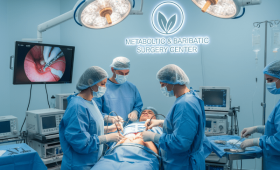Why Is Bariatric Surgery Popular In Kusadasi?
Kusadasi has become a popular destination for bariatric surgery by combining high-quality health services with a relaxing tourist environment. Health institutions in the region operate according to international standards while offering much more affordable treatment options compared to centers in Europe and America, in particular. The opportunity to spend the post-operative resting and recovery period in the peaceful atmosphere of the Aegean is one of the key factors that make Kusadasi appealing. The blend of medical expertise, economic advantages, and holiday comfort makes this region a preferred choice. To select the most suitable center and package for your process, you can contact Cure Holiday.
Do Hospitals In Kusadasi Have International Accreditations?
Modern hospitals offering bariatric surgery services in and around Kusadasi generally operate in accordance with international quality and safety standards. Many healthcare institutions implement strict protocols set by international accreditation organizations such as JCI (Joint Commission International) or ISO. These accreditations are independent proof that the hospital meets high standards in areas like infection control, patient safety, surgical outcomes, and staff competency. These internationally recognized quality certificates provide an important assurance for patients arriving from abroad. You can consult Cure Holiday for information about accredited hospitals.
Is A Language Barrier Experienced During The Surgery Process?
Since Kusadasi is a prominent region in health tourism, bariatric surgery centers are structured to serve international patients. Therefore, hospitals and support services have staff or professional medical interpreters who speak languages such as English, German, and French. These services ensure that communication between the patient and the healthcare team is complete and accurate, helping patients feel safe and understood. All information before, during, and after the surgery will be provided in your native language. Cure Holiday guarantees you interpreter support and ease of communication throughout your treatment journey.
What Are The Necessary Tests Before Surgery?
Before bariatric surgery, a comprehensive set of tests and examinations are conducted to assess the patient’s suitability for the operation and the anesthesia risk. This mandatory preparation process includes a complete blood count, biochemistry panel, liver and kidney function tests, thyroid panel, EKG, chest X-ray, and upper gastrointestinal endoscopy. Additionally, vitamin (especially B12 and D) and mineral levels are checked to detect potential nutritional deficiencies. This detailed screening is vital for the safe execution of the surgery. Cure Holiday will assist you in coordinating all your pre-operative tests.
How Is Post-Operative Monitoring Carried Out?
Post-operative monitoring is critical for both the patient’s short-term recovery and long-term weight management. Final checks and information are provided before the patient is discharged from the hospital. The first follow-up appointment is usually held one week after discharge. In the long term, monitoring is conducted remotely via telephone, video calls, or online systems. These check-ups track the patient’s nutritional status, rate of weight loss, and vitamin-mineral levels. You must remain in contact with Cure Holiday to access lifelong follow-up programs.
What Are The Transportation And Accommodation Facilities In Kusadasi?
Kusadasi is highly advantageous in terms of transportation due to its proximity to the international Adnan Menderes Airport (ADB). Patients can be easily transferred from the airport to their accommodation or the hospital. Most treatment packages include transportation services between the airport and the hospital. For accommodation, high-standard hotels or comfortable patient guesthouses are available near the hospital. The patient is ensured a peaceful and comfortable environment for their recovery process. Cure Holiday will make special arrangements for all your transportation and accommodation needs.
What Does The Surgery Package Cover?
Bariatric surgery packages are generally designed to cover the patient’s entire treatment process. This scope may include the surgical procedure itself, the hospital stay duration, necessary medical tests, anesthesia fees, post-operative medications, and specialized nutritional support. Furthermore, airport transfers and interpreter services during the hospital stay are also part of the standard packages. Since the content of each package may vary, it is advisable to contact Cure Holiday to learn exactly what is included and to obtain transparent pricing information.
How Are The First Days After Surgery Spent?
The first days after surgery are spent comfortably under close supervision in the hospital. Since the surgical procedure is performed laparoscopically (minimally invasive), pain is minimal and effectively controlled with intravenous (IV) pain relievers. Liquid intake begins on the first days, and the patient is encouraged to take short walks. This early mobility is important for reducing the risk of blood clots and accelerating recovery. The medical team continuously monitors the patient’s vital signs for potential complications. The Cure Holiday team will support you during this critical early process.
What Are The Advantages Of Laparoscopic Surgery?
Laparoscopic (minimally invasive) surgical techniques are standardly used in bariatric surgeries and offer many significant advantages over traditional open surgery. This minimal invasive method involves smaller incisions, leading to less pain, smaller scars, a lower risk of infection, and a shorter hospital stay for the patient. Patients can return to their normal daily activities much faster. Laparoscopic surgery speeds up the recovery process, making your time in Kusadasi more comfortable. You can consult Cure Holiday for detailed information about laparoscopic surgical techniques.

Why Do Surgery Costs Vary?
Surgery costs can vary depending on many factors. Key elements influencing the price include the hospital’s technological equipment and level of international accreditation, the scope of the surgery package (does it include accommodation, transfer, medications, long-term follow-up?), and the quality of the surgical materials used. The type of surgical procedure chosen (Mini Bypass, Classic Bypass, Sleeve Gastrectomy) also directly affects the cost. To find the optimal balance between price and service, you need to transparently compare the contents of different packages. Cure Holiday will offer you options suitable for your budget.
Are There Places To Visit In Kusadasi During The Recovery Period?
Kusadasi offers an environment that can make the recovery period enjoyable due to its proximity to the cultural and natural beauties of the Aegean Region. Although heavy physical activity is prohibited for the first few weeks after surgery, short and relaxing walks are recommended. It is possible to get fresh air by the seaside or take short trips to nearby historical sites like the Ephesus Ancient City. However, all these activities must be done with the approval of the physician and accompanied by your companion, without overexerting yourself. You can seek support from Cure Holiday for safe travel suggestions during your recovery period.
How Is Post-Operative Nutritional Counseling Provided?
Post-operative nutritional counseling is vital for the long-term success of the surgery. Treatment centers offer personalized, staged nutrition programs through dietitians specializing in bariatric surgery. This process, which progresses with liquids in the first stage, followed by purees and soft foods, allows the patient to adapt to the new gastric pouch. Nutritional monitoring continues remotely through regular phone calls or online platforms for many years after discharge. Cure Holiday will direct you to the most suitable nutrition specialists to access these lifelong support programs.
How Soon After Surgery Is Air Travel Safe?
Air travel is generally safe 5 to 7 days after bariatric surgery, with the surgeon’s approval. This period is necessary for the patient to complete the initial recovery phase and for the risk of potential early complications to decrease. To minimize the risk of blood clots during air travel, it is important for the patient to walk frequently and maintain adequate fluid intake. Cure Holiday will guide you in determining the date of your return flight and any special precautions needed during the planning of your treatment.
What Is The Average Duration Of The Surgery?
The average duration of bariatric surgical procedures (Mini Bypass, Classic Bypass, Sleeve Gastrectomy) varies depending on the chosen method and the patient’s specific anatomical conditions. Laparoscopic procedures generally last between 1 and 3 hours. Mini Gastric Bypass, involving a single connection, can often be completed in a shorter time than Classic Gastric Bypass. Experienced surgical teams minimize the time the patient spends under anesthesia by keeping the operation duration as short as possible. You can consult Cure Holiday for detailed information about the estimated duration of your surgery.
What Is The Length Of Stay In The Hospital?
The length of stay in the hospital after bariatric surgery generally ranges from 3 to 5 days, depending on the patient’s general health status, recovery rate, and the type of procedure performed. During this period, patients are kept under medical observation, begin liquid intake, and gain minimal mobility. The decision for discharge from the hospital is only given when all vital functions are stable, pain is controlled, and there is no risk of any complications. Cure Holiday will assist you in planning your stay in the comfortable hospitals of Kusadasi.
What Are The Eligibility Criteria For Obesity Surgery?
Eligible candidates for obesity surgery must meet strict criteria determined by international medical guidelines. The generally accepted criteria are individuals with a Body Mass Index (BMI) of 40 and above, or those with a BMI between 35 and 40 who have serious associated health problems related to obesity such as Type 2 diabetes, hypertension, or sleep apnea. Furthermore, the patient is expected to have failed previous attempts at weight loss through diet and exercise and to be committed to making post-operative lifestyle changes. You must consult the expert advisors at Cure Holiday for a complete assessment of your suitability.
How Is Post-Operative Pain Management Handled?
Post-operative pain management is of great importance for the patient’s comfort and early recovery. Thanks to laparoscopic surgery, the severity of pain is low and is controlled with effective medication while you stay in the hospital. Generally, strong intravenous pain relievers are used for the first few days, and prescribed oral medication is given to the patient upon discharge. Although the time for the pain to completely disappear varies from person to person, it usually subsides to a level that does not affect daily activities within a week. For detailed information on comfortable pain protocols, you can contact Cure Holiday.

Why Is Long-Term Follow-Up Necessary?
Bariatric surgery is a lifelong process that requires permanent nutritional and lifestyle changes. Long-term follow-up is mandatory to ensure both the maintenance of weight loss and the prevention of vital vitamin and mineral deficiencies. Since surgeries alter absorption, regular blood tests must be conducted, and supplement doses must be adjusted throughout life. Consultations with dietitians and psychological support help the patient solidify their new habits. Cure Holiday will continuously guide you to ensure this vital follow-up chain is maintained and support is provided.
What Are The Metabolic Benefits Of Bariatric Surgery?
Bariatric surgery not only provides weight loss but also creates extraordinary positive effects on the metabolic processes in the body. The most prominent metabolic benefit is seen in the treatment of Type 2 diabetes; in many patients, blood sugar levels rapidly normalize after surgery, and the need for medication disappears (remission). Furthermore, significant improvements are observed in other obesity-related health problems such as high blood pressure, high cholesterol, and sleep apnea. These metabolic improvements enhance the patient’s overall quality of life and lifespan. You can consult Cure Holiday to learn about your potential benefits in this regard.
What Is The Difference Between Mini Bypass And Classic Bypass?
The fundamental difference between Mini Gastric Bypass and Classic Gastric Bypass is the number of connections (anastomoses) created in the small intestine. In Classic Bypass (Roux-en-Y), two separate connections are made, whereas in Mini Bypass, only a single connection is established. While Mini Bypass is technically simpler, the risk of bile reflux is theoretically higher than the Classic Bypass. Classic Bypass, on the other hand, offers a better solution for patients with reflux complaints. Your physician will recommend the most suitable option based on your personal health status and risk profile. For detailed comparison of these methods, you can consult Cure Holiday.
To Whom Is Sleeve Gastrectomy Most Often Applied?
Sleeve Gastrectomy (Tüp Mide) is one of the most commonly performed bariatric surgical methods today and is often considered the first option for patients newly beginning obesity surgery. This surgery is performed by permanently removing approximately 80% of the stomach volume and eliminating the region where the appetite hormone (Ghrelin) is largely secreted. Therefore, it is primarily applied to patients who seek weight loss based on volume restriction, do not want a serious risk of malabsorption, and meet the appropriate BMI criteria. Consult Cure Holiday to find out if Sleeve Gastrectomy is the right starting point for you.
Are Revision Surgery Options Available In Kusadasi?
Yes, some bariatric centers in Kusadasi offer revision surgery options for patients who have experienced insufficient weight loss, weight regain, or complications after previous bariatric surgeries (e.g., Sleeve Gastrectomy or older Bypass types). Revision surgeries can be more complex than the initial operation and require the high experience of the surgical team. Conversion from Mini Bypass to Classic Bypass or procedures to increase restriction are among these revisions. You can contact Cure Holiday to have your past surgical history analyzed in detail and to learn about your revision options.
Does Vitamin Supplementation Continue For Life After Surgery?
The use of vitamin and mineral supplements generally continues lifelong after surgical procedures that cause malabsorption, such as Gastric Bypass. Bypassing a portion of the stomach and small intestine permanently reduces the absorption of essential nutrients like B12, Vitamin D, iron, and folic acid. Since these deficiencies can lead to serious health problems, it is mandatory for patients to take supplements regularly and have their blood values checked. This need may be less in Sleeve Gastrectomy but supplements may still be required. Cure Holiday will assist you with your long-term supplementation plan and requirements.
Should Smoking And Alcohol Be Quit Before Surgery?
It is absolutely mandatory to completely quit smoking and alcohol consumption before bariatric surgery. Smoking slows wound healing, significantly increases the risk of vital complications such as infection and leakage. It also triggers the formation of post-operative stomach ulcers. Alcohol should be quit because it is high in calories and increases the burden on the liver after surgery. Physicians usually require these substances to be discontinued at least 4 to 8 weeks before the operation. Adherence to this rule is mandatory for the safety of the surgery. You can seek guidance from Cure Holiday for support in the cessation process.
Can A Companion Stay With Me In The Hospital?
Most modern health centers in Kusadasi, considering the comfort of international patients, allow a companion to stay with the patient in the hospital. The presence of a companion helps the patient feel safer and more comfortable, especially in the first days after the surgery. An extra bed is provided for the companion in private patient rooms. Generally, staying with a companion is possible, except for some intensive care or special situations. Cure Holiday will assist you with detailed information and organization regarding accommodation and companion conditions.
What Is The Most Suitable Period For Treatment In Kusadasi?
The most suitable period for bariatric treatment in Kusadasi is generally the spring (April-May) and autumn (September-October) months. During these periods, air temperatures are not oppressively high, which makes the post-operative recovery process more comfortable. Furthermore, the intense tourist crowds and high season prices of the summer months are lower during these times. These periods are ideal for patients who want a tranquil environment for rest and recovery. You can contact Cure Holiday to evaluate these seasonal advantages when planning your travel and treatment.

How Is The Emergency Management Of Hospitals?
Hospitals providing health tourism services must always be prepared for potential complications. Therefore, experienced emergency medicine and intensive care teams are on duty 24/7 at centers where bariatric surgery is performed. Hospitals have modern, well-equipped Intensive Care Units (ICUs). This ensures that any surgical complication or emergency, however rare, can be managed in the fastest and most effective way. Cure Holiday will provide you with information about the emergency protocols of the treatment centers in Kusadasi.
How Long Does The Weight Loss Process Take?
The weight loss process after bariatric surgery consists of two main stages: a rapid phase that usually occurs within the first 12 to 18 months after the surgery, followed by a plateau/stabilization phase. Patients lose the majority of their excess weight (e.g., 60-80%) during this initial rapid phase. This process is directly related to the patient’s adherence to nutritional rules and exercise. You can consult the expert advisors at Cure Holiday for personal estimates of your time to reach your target weight and expected weight loss rates.
How Is Excess Skin That Forms After Surgery Resolved?
Excess skin formation, an inevitable consequence of significant weight loss, usually cannot be completely resolved with non-surgical methods. Aesthetic surgery procedures (body lift, abdominoplasty, arm lift, etc.) may be necessary to correct body contours and remove excess skin. These aesthetic surgeries are typically planned 1 to 2 years after the bariatric surgery, once the patient’s weight has stabilized and body values have normalized. To get information about the aesthetic solutions and timing in this process, you can consult the aesthetic surgery advisory services of Cure Holiday.
How Are Hospital Admission Procedures Handled?
Hospital admission procedures at health tourism centers in Kusadasi are significantly simplified for patients as they are usually pre-organized by intermediary institutions like Cure Holiday. All the patient’s medical records and pre-test results are sent to the hospital in advance. Transfer is provided from the moment the patient arrives at the hotel or airport, and all paperwork is quickly completed upon admission to the hospital. This organized process reduces the patient’s stress, allowing them to focus directly on the treatment. Cure Holiday will accompany you to ensure your admission procedures run smoothly.
What Is The Preparation Process After The Decision For Surgery?
After the decision for surgery is made, a critical process begins for the patient to prepare for the operation. This process generally includes a special low-calorie diet (aimed at reducing the liver size) implemented under the guidance of a specialist, cessation of smoking and alcohol, and psychological evaluations. The physical and mental readiness of the patient for surgery is a basic requirement for achieving successful outcomes. Cure Holiday will provide you with detailed guidance on the steps to be taken and the special diet programs to be followed during this preparation period.
When Are Post-Operative Control Appointments Held?
Post-operative control appointments are planned at specific intervals to monitor the patient’s healthy progress. The first check-up is usually done just before discharge from the hospital. Subsequently, regular follow-up appointments are scheduled for one week, one month, three months, six months, and one year after the surgery. Most of these appointments can be conducted remotely (online or by phone) for international patients. Adhering to this regular follow-up schedule is vital for both your health and the success of the surgery. Cure Holiday will assist you in planning your control appointments schedule.
What Do International Patient Services Include?
International patient services are designed to make the treatment process of patients coming from abroad as comfortable and smooth as possible. These services include airport meet and greets and transfers, accommodation arrangements, 24/7 interpreting support, appointment scheduling, and the assignment of a personal patient representative throughout the treatment period. This comprehensive support allows the patient to focus solely on recovery and minimizes the stress of being in a foreign country. You can contact Cure Holiday to benefit from these privileged services.
Why Should Obesity Surgery Only Be A Last Resort?
Obesity surgery should only be considered as a last resort because it is a major intervention that causes permanent changes in the body and carries serious risks, to be used only when other weight loss methods (diet, exercise, medication) have failed. This means that the patient must have attempted all conventional methods of fighting obesity and meet the BMI criteria before resorting to surgery. Surgery is not a miracle cure but a powerful tool that opens the door to permanent lifestyle changes. For an honest evaluation of all your attempts before surgery, you can seek support from Cure Holiday experts.
What Is The Experience Of The Bariatric Team In Kusadasi Centers?
Centers serving health tourism in the Kusadasi region generally have teams that perform high-volume bariatric operations and have received training in accordance with international standards. These teams, consisting of surgeons, anesthetists, dietitians, and nurses, have deep experience in managing potential risks and preventing complications during the process. High patient volume has ensured the specialization of the teams. Cure Holiday will give you the most accurate guidance to learn more about team experience and surgical volume and to reach the most experienced team.
What Medications Are Used After Surgery?
Medications used in the post-operative period generally consist of painkillers, anti-nausea drugs, and stomach protectors. Stomach protectors are critical for preventing ulcer formation in the new gastric pouch and are often used for several months. These medications are given to the patient upon discharge from the hospital, and their use is regulated by the physician’s instructions. Additionally, vitamin and mineral supplements that must be used lifelong in bypass procedures also fall into this category of medication. Cure Holiday will provide you with the necessary information about your medication and supplement plan.



